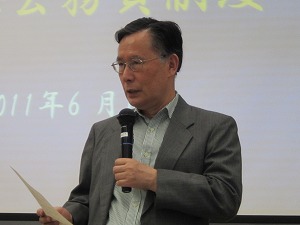本日6月14日の国際機構論の授業では、長谷川祐弘教授が「国際公務員制度」についてご講義されました。特に、「国際公務員の権利と責任」と「国連共通制度(UN Common System)」という2点について、経験談を含めて詳しく説明されました。今までの8人の各々の事務総長の性格や政策について話されながら、行政府の長(Chief Administrative Officer)としての、国連事務総長の任務について説明されました。そして、国際公務員の国際性と独立性、国際公務員の構成と分類、地位、そして国際公務員の採用条件と方法や任務の管理について述べられました。その中で、ノーブルメイヤ原則(Noblemaire Principle)の意義を強調され、国連憲章の第100条[職員の国際性]、第101条[職員の任務]について説明されました。国際機関の機能別分類と国連システムに働く職員(専門職、一般職)については、基本給や地域調整給、教育補助金など「国連職員の勤務条件」について詳しく説明されました。最後に、国際機関職員の採用方法について言及され、とりわけ、採用に向けての取組みとして、国連は「コンピテンシー」の概念を重要視しており、国連などに入りたい人は、このことを十分理解する必要性を説かれました。主に、コンピテンシーの中でも、包括的なコミュニケーション能力の重要性を指摘されました。(キムミンシク)
On the 14th of June 2011, Professor Hasegawa lectured on the international civil servant system, presenting the rights and responsibilities of an international civil servant, and the UN common system. Prof. Hasegawa specifically focused on the responsibilities of the United Nations Secretary-General, which are founded upon the UN Charter as well as each of the former eight UN Secretary-Generals as Chief Administrative Officer. Prof. Hasegawa also touched on internationality, independence, formation, classification, standing, employment methods and administrative duties of an international civil servant. Among them, Prof. Hasegawa expounded on the meaning of Noblemaire Principle and explained the significance of Article100 [Internationality of the Officer] and Article 101 [Responsibility of the Officer]. Moreover, Prof. Hasegawa explained the functional classification of international organization, servants working in the UN system (both professional and general servants), and the working condition of a UN servant – his or her base floor salary, post adjustment, education grant, and so on. The enrollment method of international organization concluded Prof. Hasegawa’s lecture, in which he emphasized the need to understand and increase competency, particularly the importance of communication skills. (Minshik KIM)

